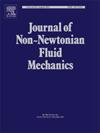Yield-stress effects on spontaneous imbibition in paper-based kits
IF 2.8
2区 工程技术
Q2 MECHANICS
引用次数: 0
Abstract
The classic Richards equation is a good model for predicting imbibition of viscous fluids in porous materials such as dry soils or filter papers. It cannot, in principle, be used for physiological fluids such as blood simply because such fluids often exhibit a variety of non-Newtonian behavior such as a yield stress. In the present work, we have theoretically extended the classic Richards equation to viscoplastic fluids obeying the Bingham model using the concept of the effective viscosity together with the bundle-of-tube model. The new imbibition model could partly resolve the discrepancy reported in the literature between the predictions of the classic Richards equation for the stain growth of sessile blood droplets in a typical filter paper. A better fit, however, requires considering other non-Newtonian effects of the blood such as its viscoelasticity. Using the Bingham-modified Richards equation, it is demonstrated that yield stress in a test fluid has a retarding effect on the imbibition phenomenon, so that such fluids may not necessarily reach the test line of a paper-based diagnostic kit. But yield stress is predicted to extend the duration of the quasi-steady regime on the test line of diagnostic kits, which is a desirable effect. The results suggest that inducing (or elevating) the level of yield stress in a test liquid such as blood can be used as a passive means to control imbibition characteristics in paper-based systems.
产量应力对纸质试剂盒自发浸泡的影响
经典的理查兹方程是预测粘性流体在多孔材料(如干燥土壤或滤纸)中浸润情况的良好模型。原则上,它不能用于血液等生理流体,原因很简单,这类流体通常表现出各种非牛顿行为,如屈服应力。在本研究中,我们利用有效粘度概念和管束模型,从理论上将经典的理查兹方程扩展到服从宾汉模型的粘弹性流体。新的浸润模型可以部分解决文献中报道的经典理查兹方程对典型滤纸中无柄血滴的染色生长预测之间的差异。不过,要想获得更好的拟合效果,还需要考虑血液的其他非牛顿效应,如粘弹性。使用宾厄姆修正理查兹方程证明,测试液体中的屈服应力对浸润现象有延缓作用,因此这类液体不一定能到达纸质诊断试剂盒的测试线。但根据预测,屈服应力会延长诊断试剂盒检测线上准稳定状态的持续时间,这是一种理想的效果。研究结果表明,诱导(或提高)血液等测试液体的屈服应力水平可作为一种被动手段来控制纸质系统的浸泡特性。
本文章由计算机程序翻译,如有差异,请以英文原文为准。
求助全文
约1分钟内获得全文
求助全文
来源期刊
CiteScore
5.00
自引率
19.40%
发文量
109
审稿时长
61 days
期刊介绍:
The Journal of Non-Newtonian Fluid Mechanics publishes research on flowing soft matter systems. Submissions in all areas of flowing complex fluids are welcomed, including polymer melts and solutions, suspensions, colloids, surfactant solutions, biological fluids, gels, liquid crystals and granular materials. Flow problems relevant to microfluidics, lab-on-a-chip, nanofluidics, biological flows, geophysical flows, industrial processes and other applications are of interest.
Subjects considered suitable for the journal include the following (not necessarily in order of importance):
Theoretical, computational and experimental studies of naturally or technologically relevant flow problems where the non-Newtonian nature of the fluid is important in determining the character of the flow. We seek in particular studies that lend mechanistic insight into flow behavior in complex fluids or highlight flow phenomena unique to complex fluids. Examples include
Instabilities, unsteady and turbulent or chaotic flow characteristics in non-Newtonian fluids,
Multiphase flows involving complex fluids,
Problems involving transport phenomena such as heat and mass transfer and mixing, to the extent that the non-Newtonian flow behavior is central to the transport phenomena,
Novel flow situations that suggest the need for further theoretical study,
Practical situations of flow that are in need of systematic theoretical and experimental research. Such issues and developments commonly arise, for example, in the polymer processing, petroleum, pharmaceutical, biomedical and consumer product industries.

 求助内容:
求助内容: 应助结果提醒方式:
应助结果提醒方式:


